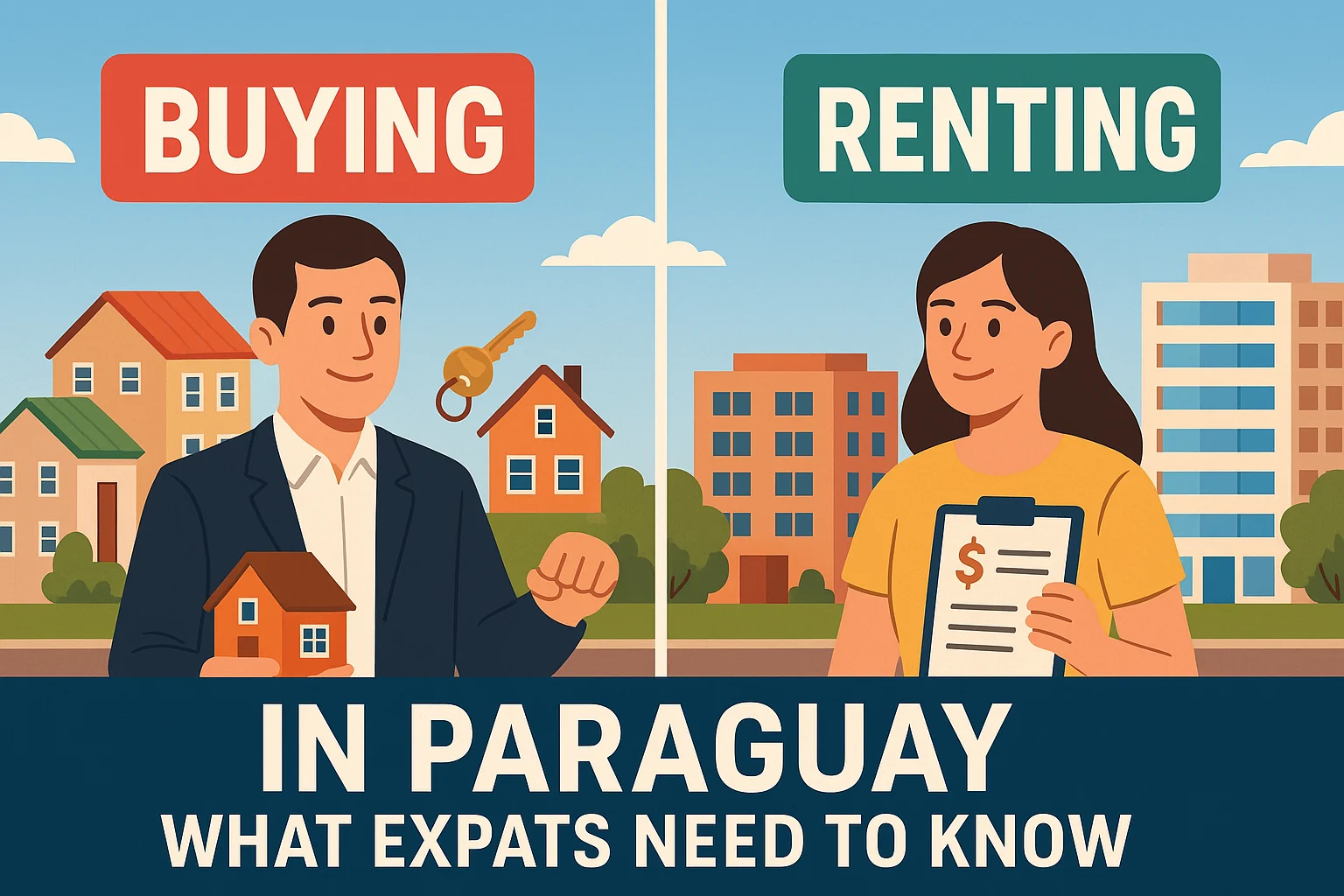Paraguay is quickly gaining traction among international expats, investors, and digital nomads looking for affordable living, economic stability, and a welcoming culture. Asuncion, the capital, is seeing growing interest from foreigners drawn to its strategic location in South America, low cost of living, and attractive real estate market. One of the most common questions expats ask is: should I buy or rent property in Paraguay? This guide provides an expert analysis of the pros and cons of buying vs. renting, along with cost comparisons, legal processes, and tax implications in 2025.
1. Real Estate Market Overview in Paraguay (2025)
The Paraguayan real estate market is considered one of the most accessible in Latin America for foreign investors. There are no legal restrictions on foreigners owning property, and the buying process is relatively straightforward.
Key benefits of the market:
- Low entry prices compared to Brazil, Argentina, or Uruguay.
- A stable local currency (Guaraní) with growing demand for USD-denominated assets.
- High rental yields in central districts like Villa Morra, Carmelitas, and Las Mercedes.
2. Renting in Paraguay
Pros:
- Low commitment: Ideal for short stays, trial periods, or uncertain plans.
- Flexibility: Lease terms can range from 6 months to 2 years, often negotiable.
- No ownership taxes or maintenance responsibilities.
- Easy relocation: If you decide to move within Asuncion or to another city, it’s quick and simple.
Cons:
- You’re subject to the landlord’s decisions (e.g., no pets, no modifications).
- Annual rent increases are allowed, sometimes unregulated in informal leases.
- No return on investment: all payments go toward the landlord.
Average rental costs (2025):
- 1-bedroom in Villa Morra: $400–$600/month
- 2-bedroom apartment in Recoleta or Las Mercedes: $500–$800/month
- Furnished house in suburbs: $900–$1,200/month
Rental process: Most landlords require:
- One month deposit
- Proof of income or guarantor
- Lease agreements in Spanish (legal translation is advised)
3. Buying Property in Paraguay
Pros:
- Full ownership rights for foreigners
- Capital appreciation potential in emerging neighborhoods
- Rental income opportunity (long-term or Airbnb)
- Asset protection and inflation hedge
- Can help with residency processes (owning real estate shows local ties)
Cons:
- Requires upfront capital (often in cash, mortgages for foreigners are rare)
- Less flexibility if you plan to move frequently
- Legal processes must be followed carefully to avoid land title issues
Average purchase prices (2025):
- 1-bedroom modern apartment in Villa Morra: $80,000–$120,000
- 2-bedroom in Carmelitas or Recoleta: $120,000–$180,000
- Large home in Las Lomas: $200,000+
- Undeveloped land in suburban areas: $15,000–$50,000 per lot
Buying process:
- Hire a local attorney/notary (escribano)
- Due diligence: confirm clean title, taxes paid, and zoning status
- Sign preliminary contract and pay deposit
- Finalize at notary office, register at Public Registry
4. Taxes & Legal Considerations
If you rent:
- You do not pay property tax
- Some rental income may be subject to tax for the landlord
- Tenants typically pay utilities and sometimes building fees (expensas)
If you buy:
- Property tax (Impuesto Inmobiliario): Very low, around 0.3% annually
- Transfer tax (Impuesto a la Transferencia de Inmuebles): 1.5% of declared value
- Notary/legal fees: Around 3% of purchase price
- Capital gains tax: 8% if you sell at a profit (not always enforced)
5. Expat Strategy: Buy or Rent?
You should consider renting if:
- You’re staying less than 12 months
- You want to test different neighborhoods
- You have limited knowledge of the market
- You’re waiting for permanent residency approval
You should consider buying if:
- You plan to stay long-term or visit annually
- You want to invest and generate income
- You have the capital and want to protect it
- You’re looking for a base in South America
6. Final Thoughts: What Expats Should Really Know
Paraguay offers a uniquely affordable and expat-friendly real estate market. Renting is ideal for flexibility and newcomers, while buying can be a strategic move for long-term residents, investors, and those seeking stability in a fast-developing country.
Before making any decision, consult a bilingual real estate attorney, visit neighborhoods in person, and assess your own financial goals. With low taxes, rising property values, and a growing expat community, both renting and buying in Paraguay can be rewarding — if done right.






Leave a Reply